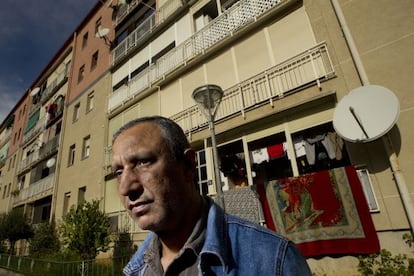Aziz’s mortgage is abusive
Spanish judge rules in favor of evicted man who had taken case to Luxembourg

Mohamed Aziz, a Moroccan laborer evicted from his apartment in Martorell near Barcelona two years ago, was at the origin of the European Court of Justice (ECJ) ruling that struck down Spanish mortgage law. In March Aziz hailed that ruling as a victory of “the weak over the strong.” His case, however, had then not yet been ruled on in a Spanish court.
Now, however, the judge at the head of a Barcelona Mercantile Court, José María Fernández Seijo, has decided on Aziz’s suit against the bank CatalunyaCaixa, and declared three clauses of the mortgage contract null due to its “abusive” terms.
In his lengthy ruling, the judge notes that Aziz might have “better marshaled his means of defense against abusive clauses” before being evicted with his family for not having paid several monthly installments, thus causing him “a loss now difficult to repair.”
His lawyer, Dionisio Moreno, demanded that the eviction be declared null. Though agreeing, Seijo notes this demand is “complicated to arrange,” among other reasons because he does not know whether the apartment in question is now occupied by third persons. “It won’t be easy, but our objective is for him to regain possession; then we’ll see,” says Moreno.
In July 2011, before reaching a decision, Seijo had passed the question up to the ECJ in Luxembourg for an opinion on whether Spanish mortgage law violated consumers’ rights. The European resolution came in March, concluding that the law by which thousands have so far been evicted is incompatible with the EU directive that protects consumers, thus empowering Spanish judges to suspend evictions while mortgage clauses are examined.
The ruling “has given another dimension to the proceedings” of Aziz, adds Seijo, in that “it has coincided with intense public debate” on the drama of evictions, and that there are “economic, social and political factors” involved in the case. For example, the fact that “an apartment of barely 50 square meters in a housing-block development outside Barcelona” was assigned a value of 194,000 euros. Or that Aziz had to devote 70 percent of his income to paying the mortgage. When he signed the contract, in 2007, Aziz had a stable job as a skilled machinist and made 1,341 euros a month. Later he lost his job.
Seijo struck down as “abusive” three clauses of the contract signed with the regional savings bank Caixa Tarragona, which later merged with CatalunyaCaixa. The penalty interest charges, set at 18.75 percent, are “abusive in that they are disproportionate” and besides were “wrongly calculated.”
The “early expiration” clause is also ruled to be null. The bank proceeded to eviction though Aziz had missed only a few payments, amounting to 453 euros, “or 0.328 percent of the loan, granted for a term of 33 years.” This was too small a default for so drastic a measure, all the more so in a “context of economic crisis.” Then, too, the bank “unilaterally” appraised the pending capital to be paid off.
The court ruling also deals with the fact that the bank in its plea questioned the judge’s neutrality. “What must a judge decide on in his ruling? The case of Sr Aziz, or the fairness of Spanish mortgage law? Sincerely, this party perceives that it is hard for a judge to resist the media pressure in such a case […] We already know the maxim that reality cannot be allowed to spoil a good headline,” the bank’s lawyer had argued.
In his conclusions, Seijo, too, indulges in a touch of irony and says that the bank’s arguments are proof of the “transcendence, even if symbolic” of the EU court’s ruling. Amid the skepticism, however, he has decided that each party should pay a share of the costs.
Tu suscripción se está usando en otro dispositivo
¿Quieres añadir otro usuario a tu suscripción?
Si continúas leyendo en este dispositivo, no se podrá leer en el otro.
FlechaTu suscripción se está usando en otro dispositivo y solo puedes acceder a EL PAÍS desde un dispositivo a la vez.
Si quieres compartir tu cuenta, cambia tu suscripción a la modalidad Premium, así podrás añadir otro usuario. Cada uno accederá con su propia cuenta de email, lo que os permitirá personalizar vuestra experiencia en EL PAÍS.
¿Tienes una suscripción de empresa? Accede aquí para contratar más cuentas.
En el caso de no saber quién está usando tu cuenta, te recomendamos cambiar tu contraseña aquí.
Si decides continuar compartiendo tu cuenta, este mensaje se mostrará en tu dispositivo y en el de la otra persona que está usando tu cuenta de forma indefinida, afectando a tu experiencia de lectura. Puedes consultar aquí los términos y condiciones de la suscripción digital.









































